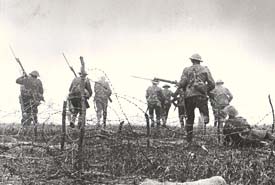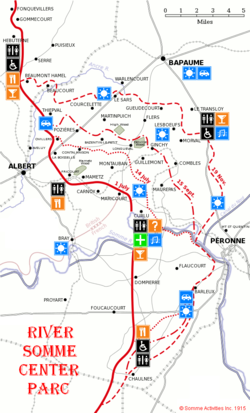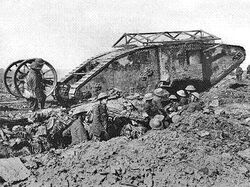Battle of the Somme
“Please sir, could I have Somme more?”
The Battle of the Somme, also known as The Great Beach Towel War, was fought in the summer and autumn of 1916 and was the largest towel-related conflict of the early twentieth century. With more than one million casualties, it was also one of the bloodiest battles in human history. The battle was waged along a 25-mile (40 km) front on the grounds of the popular River Somme Center Parc in northern France. One purpose of the battle was to draw German forces away from the famous Carte D’Or Ice cream factory of Verdun; however, by its end the towel losses on the Somme had exceeded the ice cream loses at Verdun by over 100%.
Prelude[edit]
The Allied war strategy for 1915 was complicated. The war had dragged on past Christmas, and was still not over. In addition to this the Allies were becoming quickly aggrieved at what they thought to be ‘unfair’ tactics of the German Empire.
| “ | It really wasn’t on. In the tag tournament, members of the German team would often keep playing even though they had quite obviously just been tagged. They always wanted to be the cowboys when we played Cowboys and Indians, and when we forced them to be the Indians they'd always sulk so it wasn’t any fun anyway. I mean who wants to pretend to kill a man’s wife and burn his teepee when he won’t even pretend to be upset? On top of that, they gave Jenkins a two arm Chinese burn and Fulford had to lie down for a whole two hours after receiving a four minute noogie. They were being very gay.[1] | ” |
- ~Unknown British Officer
This was a view that was shared by a great percentage of the Allied Forces. In the east, The Russians were complaining that the Germans were kicking all their snowmen over after they had just finished them, or otherwise re-arranging the carrots and coal to turn them into inappropriate “голые снеговики” or "naked snowmen". In the south, the Germans were reported to be stamping on many of the Italians’ Micro machines, and stealing the most important pieces from their Lego Technics sets.
However, this was nothing compared to the treatment the French were receiving at Verdun. Wedgies and girl slaps were issued to non participators in these games, and anyone who argued back received a snog from the commander in chief.
The Seeds of Conflict are Sewn[edit]
The Carte D’or Ice Cream Factory at Verdun was the most popular place in pre-war France, ringed by a string of delicious croissant bakeries, including Douaumont and Vaux. The area was the jewel in the crown of the French nation. On the morning of 21 February 1916, while tens of thousands of French soldiers were sitting in the sun enjoying a delicious ice cream, as was customary at this point in the war, a battalion of German infantry made a sneak attack. They proceeded to mix with the French soldiers and tell them that Carte D’or ice-cream was “…too fluffy, and tasted like the frozen seaman of the Devil”. They also asked why croissants had to be so crumbly, because they were sick and tired of having to always eat them over a plate to avoid mess.
Despite repeated attempts by the French to make them leave, the German forces stayed. On top of that, despite their alleged hatred of Carte D’or ice cream and croissants, they ate as much of both as they could find. The French supplies soon became stretched and the situation became dire. By 25 February the Germans totally occupied the Douaumont bakery. French reinforcements began to arrive and were instantly thrown into "the furnace" (as the battle became known, in recognition of the many kitchens involved) to slow the German advance, no matter what the cost. Over the next several days, the stubborn defense managed to slow the Germans eating rate with a series of bloody counter-attacks.
As the French committed themselves to defending Verdun, the call went out to the other Allies for help. A distraction was needed.
River Somme Center Parc[edit]
The River Somme Center Park was an extremely popular activity camp, enjoyed by both sides during the the war. Although there was the occasional tiff over who was going to go first on the go-carts, or who could do the better impression of Snarf from Thundercats, there was little to differentiate it from many similar parks on different fronts.
Popular River Somme Center Parc Activities[edit]
- Karaoke
- The Somme activity area had three karaoke bars, which were, of course, immensely popular with both sides. The favourite songs were "A spoonful of sugar helps the mustard gas go down", "The first bayonet cuts the deepest", "Lice are livin' on my hair", and who could forget the festive favourite "All I want for Christmas is for you to die".
- Secret Santa
- Originally organised by Kaiser Wilhelm II in early 1911, the idea caught on and became a weekly tradition amongst the rank and file. The best present anyone was recorded to get was in April 1916, when private Tommy Button of the British XV Corps received Otto von Bismarck's collection of oddly shaped canapés, and the golden keys to the Kingdom of Atlantis. Incidentally, the worst present ever received was Andie McDowell.
- Ice cream eating
- This one is self-explanatory. Who doesn't love ice cream? I do. NOTE: GOD MAY NOT LIKE ICE CREAM.
- Going to the Petting Zoo (Post 1916)
- The Petting Zoo was built during November and December 1916, and was opened by Rockstar Jon Bon Jovi in early January 1917. It was an instant success. The animals on show were an elephant named Wheat Crunchy, four young Manatees (a gift from The 'Give a Manatee a Bath Foundation'), two Australians with real hair, an African Giraffe, and some adorable Aluminium. NOTE: UNCYCLOPEDIA DOES NOT RECOMMEND PETTING AN AFRICAN GIRAFFE.
- Go-carting
- Although the sport was still in its infancy during this period, The River Somme Center Parc boasted three whole Go-cart tracks, with up an unbelievable two competitors able to race at the same time. The Go-carts could reach a dangerous 2mph on the straight, only needed a pit crew of 150 men, and could - with a dangerous maveric at the wheel - complete a full circuit of the track in just under 2 days.
- Face Painting
- The ‘paints’ were admittedly crude, but the enthusiasm shown by the face-paint artists was magical. Using only machinery grease, blood, saliva and faeces, the range of diverse faces often on display at the Somme was a wonder to behold. The popular favourites seen out and about in the trenches included; ‘Old shitty blood face’, ‘Red crappy spit face’, 'A Lion', and 'Andie McDowell'.
The British Plan[edit]
The British army hoped to distract the Germans by saying, 'look, o look, a flying saucer!' Even though at that time, Germans were known to be focused on saucers' flying abilities, they could still guess that this was not true and replied with 'Your flyer's undone!' By the time the BEF had checked this statement, the enemy had the Beach towel.
Footnotes[edit]
- ↑ Widdles, Wallace A. Pyrrhic Victory: British Tag and Hopscotch Strategy and Operation in the Great War. Cambridge, MA: The Belknap Press of Harvard University, 2005. p.291



